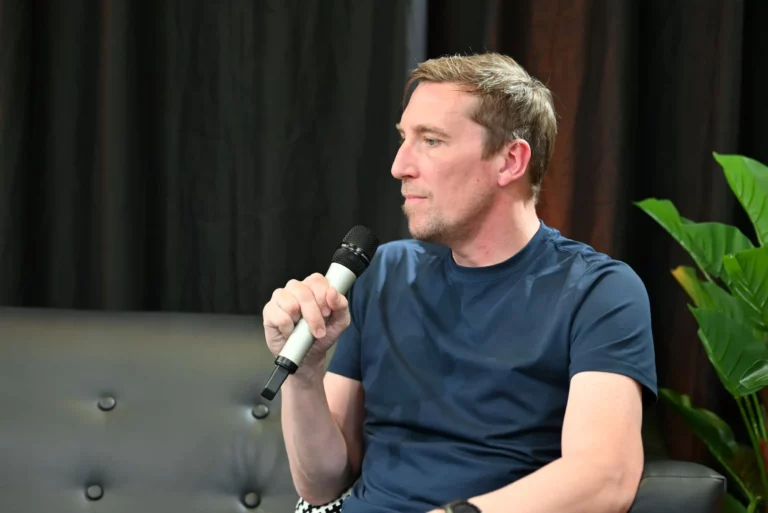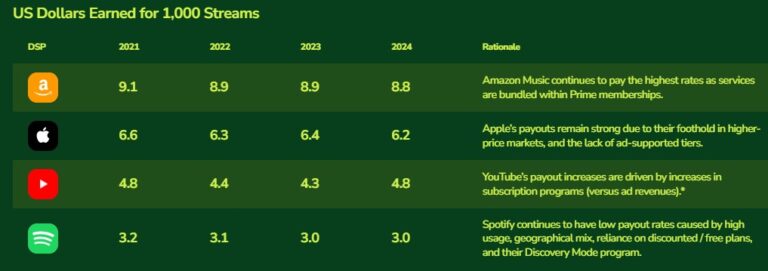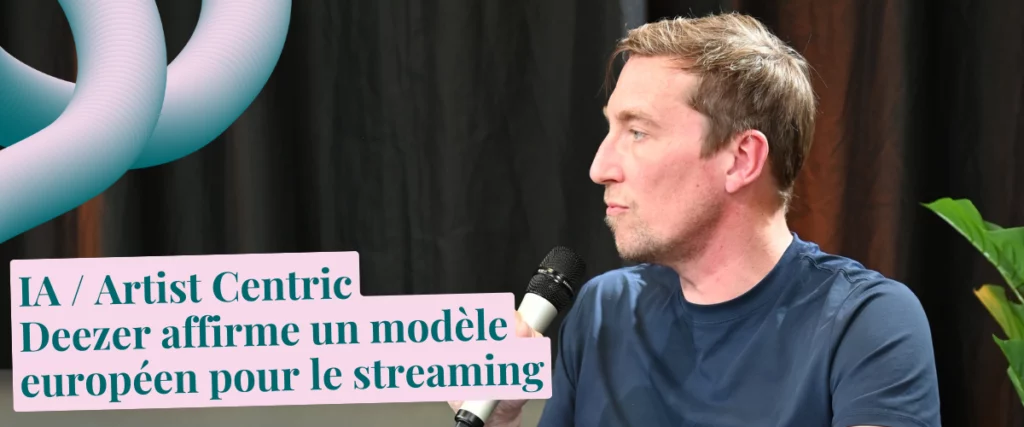Avec l’ascension fulgurante de l’intelligence artificielle, l’industrie musicale se trouve à un nouveau tournant de son existence. Chaque jour, Deezer voit déferler près de 10 000 nouveaux morceaux générés par IA, soit près de 10 % de son catalogue. Un chiffre en constante hausse qui interroge : que met-on dans les oreilles des auditeurs et comment rémunérer de façon équitable des artistes qui se sentent lésés face à cette déferlante de contenus générés par intelligence artificielle ?
Pour Aurélien Hérault, Chief Innovation Officer chez Deezer, la réponse ne peut pas être laissée au hasard. Saturation du catalogue, contenus de faible qualité, fraudes aux streams, impact écologique, rémunération des « vrais artistes » : voici quelques-unes des problématiques posées par ce phénomène. Et pour y faire face, la plateforme a décidé de passer à l’action !
L’IA, entre potentiel créatif et menace pour l’industrie
Si l’IA peut être considérée comme un outil parmi d’autres dont peuvent se servir les artistes pour donner naissance à leurs projets, elle peut devenir un véritable problème dès lors qu’elle est détournée à des fins de production massive et automatisée. Des morceaux sans auteur humain identifiable, des titres en doublon, de « faux artistes », et des comportements frauduleux dopés par des outils d’optimisation des systèmes de recommandation : l’impact du phénomène est réel sur la visibilité et la rémunération des artistes « authentiques ». À cette prolifération de contenus générés par IA, Deezer oppose une stratégie claire et sans détours : identifier, encadrer et sensibiliser.

Depuis décembre 2024, Deezer a déployé un système maison de détection des contenus IA. Fruit d’un an et demi de recherches, ce système est capable de détecter des artefacts inaudibles pour l’oreille humaine, mais parfaitement identifiables par les machines. Une fois le morceau repéré, il est taggé comme IA. Il reste écoutable, mais est exclu des systèmes de recommandation.
Avec un taux de précision de 99,8 % pour les modèles les plus populaires, la plateforme concentre ses efforts sur les usages les plus massifs, sans chercher à diaboliser l’IA : ce sont les abus que la plateforme combat, et non pas son utilisation à proprement parler. Comme le fait remarquer Aurélien Hérault, la technologie est déjà intégrée à de nombreux d’outils utilisés par les musiciens et les producteurs.
Recherche, transparence et consortium
Pour Deezer, la lutte contre les contenus IA et les tentatives de manipulation passe aussi par la R&D. Son laboratoire de recherche interne travaille d’ailleurs sur le sujet depuis plus de dix ans en se basant sur le machine learning, dépose régulièrement des brevets, et envisage même de partager une partie de ses technologies avec d’autres acteurs. La plateforme française a aussi été la première à signer la déclaration mondiale sur l’entraînement de l’IA, militant pour un modèle d’opt-in/opt-out plus transparent.
Par ailleurs, face aux mastodontes américains et chinois, Deezer s’appuie sur l’excellence européenne avec des partenaires comme Kyutai, et milite pour la mise en place d’un consortium international. Sans cadre commun, difficile en effet de faire respecter des principes vertueux.
« C’est important qu’on sache qu’on a une communauté de chercheurs et de scientifiques très forte en France et en Europe, et beaucoup qui se retrouvent en Chine et aux États-Unis. Il faut s’appuyer sur cette fabuleuse opportunité, pouvoir choisir tous les éléments et tous les outils pour définir ce qu’on veut faire, nous, en tant que français, en tant qu’européens, de la technologie, de son usage, de son développement, de sa régulation… On a le choix et je pense que c’est bien que des acteurs français ou européens prennent la parole et se disent : on a envie de construire un modèle qui nous appartient. »
Aurélien Hérault, directeur de l'innovation de Deezer
Artist centric, un modèle de répartition plus équitable
Concrètement, le modèle aujourd’hui porté par le géant français du streaming musical redirige les revenus vers les artistes professionnels, identifiés par des critères d’activité : au moins 1 000 écoutes par 500 utilisateurs uniques mensuels. Ces mêmes artistes bénéficient d’un double boost de visibilité. Une façon, parmi d’autres leviers utilisés par Deezer, de rendre les stratégies de manipulation moins rentables.
La rémunération des artistes au coeur des débats
Les plateformes de streaming musical sont la plupart du temps très discrètes sur la rémunération des ayants-droits, chacune ayant négocié pour son compte. L’effort de transparence de Deezer est une première. Juste après ces déclarations, Qobuz, plateforme également française, a marqué les esprits en partageant son taux de redistribution par stream, qui est lui 5 fois plus élevé que la moyenne.
Pour remettre en perspective, si un morceau atteint 1 000 écoutes sur Qobuz, il génère 18,73 $ pour ces ayants droit, qui paient ensuite les artistes, auteurs-compositeurs et compositeurs conformément à leurs accords contractuels. On peut saluer cette transparence, dans une industrie qui en manque souvent cruellement.

C’est la première entreprise à publier officiellement son taux de redistribution, même si des estimations sont régulièrement calculées. Duetti avait proposé une estimation à la fin de l’année 2024 qui n’avait pas manqué de faire réagir.
modèle user centric, superfans... d'autres modèles de rémunération pour les artistes
Pour Aurélien Hérault, le modèle artist centric est une première étape dans le changement de paradigme poursuivi par Deezer. Le modèle user centric, centré sur les comportements individuels des utilisateurs des plateformes. Le développement récent du segment « superfan », nouvel eldorado des acteurs de l’industrie musicale, est d’ailleurs un autre palier important dans ce long processus vers un modèle plus équitable pour les artistes et les utilisateurs.
Et les labels en ont conscience ! En 2024, Robert Kyncl, CEO de Warner, déclarait :
« Les artistes et les superfans souhaitent des relations plus profondes : c’est un domaine relativement inexploité et sous-monétisé ».
Robert Kyncl, CEO de Warner
Pour l’industrie et pour les artistes, l’engagement des (super)fans, ressemble possiblement à un eldorado. Et à un autre business model qui relègue les plateformes de streaming sur le siège arrière.
En attendant l’émergence d’acteurs disruptifs, Deezer continue d’innover pour faire correspondre technologie et respect des artistes, avec 70 systèmes de recommandation testés chaque année.
L’IA est là pour s’installer, mais elle peut être mieux encadrée. Encore faut-il que tout le monde accepte de jouer la même partition. Et il s’agit peut-être là d’un des plus grands défis de la plateforme : parvenir à mettre tous les acteurs de l’industrie d’accord autour d’un modèle unique !
Plutôt que de se lancer dans une chasse aux sorcières à l’issue très incertaine, Deezer a fait le choix d’encadrer l’usage d’une technologie incontournable et de redonner de la valeur aux artistes en chair et en os. En misant sur la transparence et la promotion de nouveaux modes de répartition, la plateforme française espère inspirer les autres acteurs du secteur musical, et pourquoi pas au-delà. Un pari audacieux, mais sans doute nécessaire pour que la création humaine continue à résonner encore longtemps dans nos enceintes et dans nos casques !
Le festival PIX réunit l'écosystème des ICC
Aurélien Hérault était invité en avril 2025 dans le cadre du festival PIX organisé par la Plaine Images. PIX est né de la volonté de faire briller les acteurs des industries cultuelles et créatives du territoire des Hauts-de-France.
À la fois temps de rencontres entre acteurs de la filière des industries créatives, PIX est aussi une vitrine d’inspiration pour les professionnels « d’ailleurs » voulant s’emparer des bonnes idées, des méthodos, de la créativité et des innovations produites au sein des ICC.
Retrouvez plus d’informations sur le site du festival.
Retrouvez le replay intégral de la conférence ici :
Et pour retrouver plus de conférences, rendez-vous sur notre chaîne YouTube.
